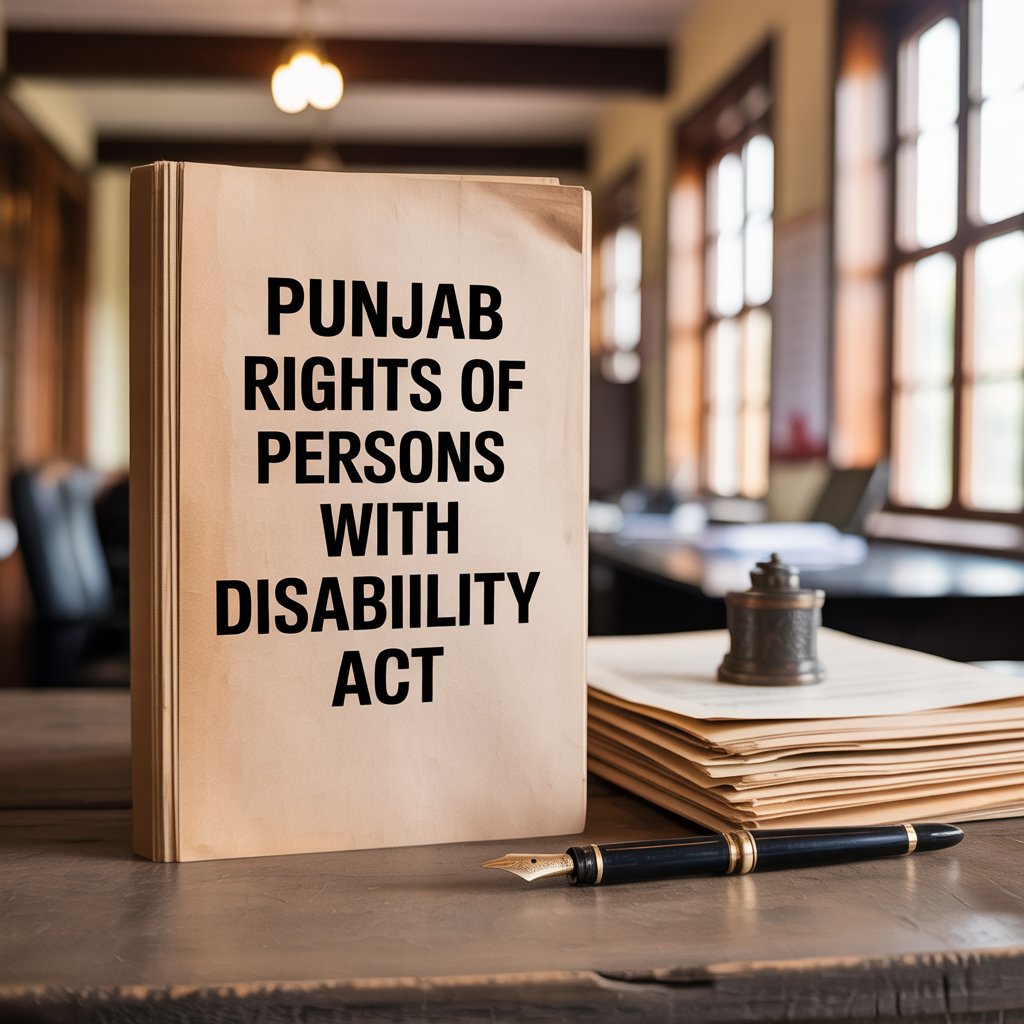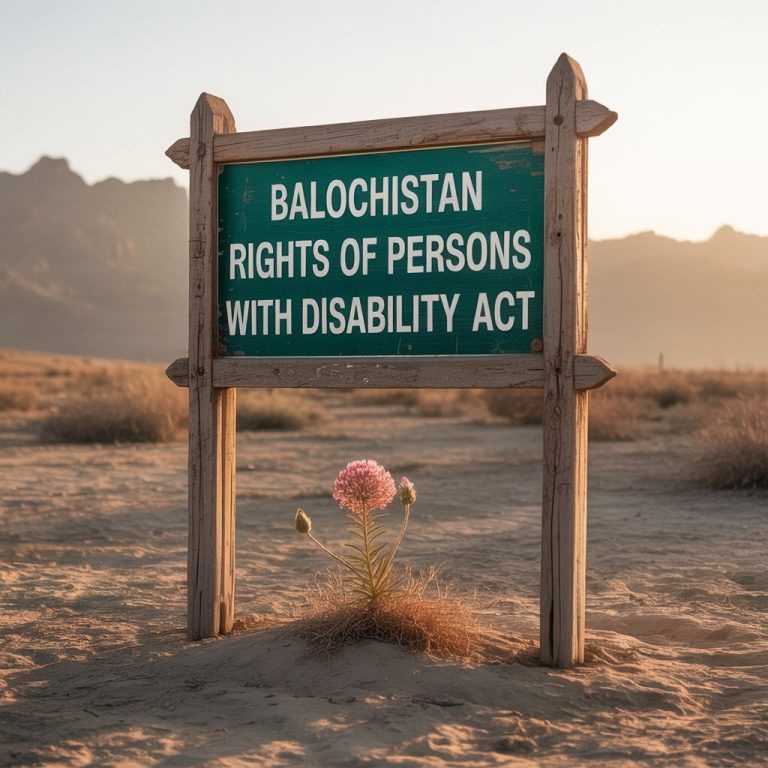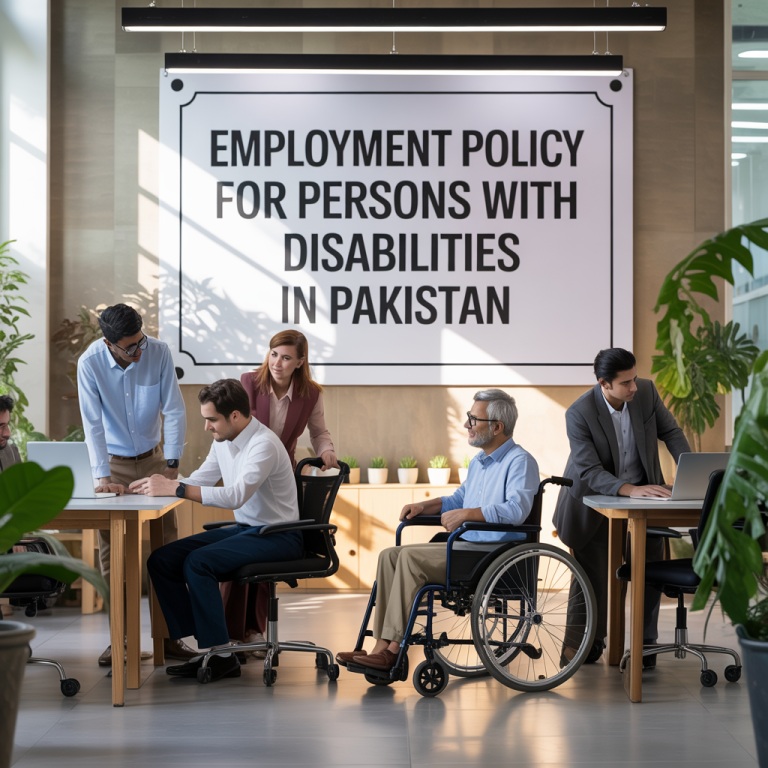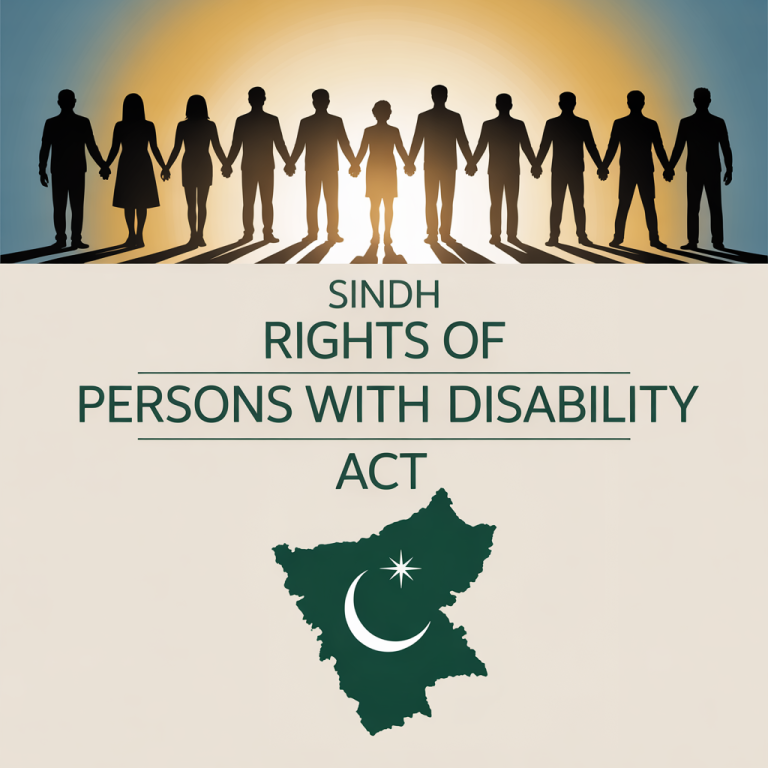Punjab Rights of Persons with Disability Act

In a major legislative milestone, the Punjab Rights of Persons with Disability Act reflects the province’s renewed commitment to upholding dignity, equality, and full participation of persons with disabilities (PWDs). Passed to align with the UN Convention on the Rights of Persons with Disabilities (UNCRPD), the Act shifts the paradigm from welfare-based aid to rights-based empowerment—an approach that recognizes PWDs as full citizens with agency and rights, not as passive recipients of care.
This article explores the features, goals, and real-world significance of this landmark legislation in Pakistan’s most populous province.
Why Punjab Needed a Disability Rights Act
Despite constitutional protections and older laws like the Disabled Persons (Employment and Rehabilitation) Ordinance of 1981, there was no comprehensive rights framework specific to Punjab. The need for a modern, enforceable law became urgent due to:
- Rising disability prevalence (approx. 12–15% of the population)
- Lack of inclusive infrastructure and services
- Minimal legal protection from discrimination
- Pakistan’s international obligation under the UNCRPD (ratified in 2011)
The new Act fills these policy gaps by recognizing disability as a social and rights issue rather than a medical limitation.
Legislative Background and Stakeholder Involvement
The law was developed after years of advocacy by:
- Disabled Persons Organizations (DPOs)
- Civil society coalitions
- Human rights institutions
- Legal experts
The Punjab Assembly passed the Act with cross-party support, marking a rare moment of consensus for social inclusion. Public consultations and legal reviews played a key role in its final form.
Scope and Coverage of the Punjab Disability Act
The Act applies to:
- All persons with physical, sensory, intellectual, and psychosocial disabilities
- Institutions (public and private) in health, education, transport, employment, and justice
- All districts and administrative regions of Punjab
It ensures that no citizen with a disability is left out, whether urban or rural, child or adult, male or female.
Guiding Principles of the Punjab Disability Act
The Act is guided by foundational values such as:
- Inclusion: Equal participation in all aspects of life
- Autonomy: Respect for individual decision-making
- Non-discrimination: Protection from exclusion or unequal treatment
- Accessibility: Removal of barriers in physical and digital spaces
- Affirmative Action: Proactive support for rights realization
Institutional Framework: Punjab Disability Rights Authority
A new Punjab Disability Rights Authority (PDRA) was established to:
- Monitor implementation of the Act
- Draft regulations and policies
- Create awareness programs
- Handle complaints from PWDs
It also includes representatives from civil society, women’s groups, and the PWD community—making it a participatory governance model.
Education Rights Under the Act
The Act mandates:
- Inclusive education in mainstream schools
- No denial of admission based on disability
- Assistive technologies and Braille materials
- Special training for teachers and school staff
- Physical accessibility in campuses
This ensures that education becomes a right, not a privilege, for every child in Punjab.
Employment Provisions and Job Quotas
Employment-related reforms include:
- 2% minimum job quota in public institutions (with some districts pledging 3%)
- Mandates for reasonable accommodations at the workplace
- Skill-building through TEVTA and vocational centers
- Financial incentives for private-sector employers hiring PWDs
The Act also prohibits forced labor and job discrimination based on disability.
Healthcare and Rehabilitation Services
The health rights section includes:
- Free assistive devices like wheelchairs, hearing aids, and white canes
- Accessible hospitals and clinics
- Inclusive mental health services
- Mobile units and telehealth services for remote areas
All services must be delivered in a dignified, non-discriminatory manner.
Accessibility in Public Infrastructure
The Act requires:
- All public buildings to be accessible within a given timeframe
- Parking spaces, toilets, signage, and service counters to accommodate PWDs
- Transportation and communication systems to be universally designed
Government departments must conduct accessibility audits and submit annual compliance reports.
Legal Protections and Anti-Discrimination Measures
Legal safeguards include:
- Right to equal legal capacity and representation
- Protections against violence, exploitation, and abuse
- Mandatory creation of legal aid desks for PWDs in district courts
- Access to police, courts, and complaint forums without barriers
Women and Children with Disabilities
Gender- and age-specific provisions include:
- Protection from sexual harassment, domestic abuse, and exploitation
- Priority in social protection schemes
- Inclusive reproductive health services for women
- Support in early childhood intervention and inclusive daycares
Transport and Mobility Rights
The Act obligates:
- Public transport systems (e.g., Metro Bus, Orange Line) to be accessible and affordable
- Railways and intercity buses to offer reserved seating and discounts
- Parking zones for wheelchair users
- Installation of audio-visual aids and mobility ramps
Technology and ICT Accessibility
The law mandates:
- Screen-reader-friendly government websites
- Accessible apps for education, health, and complaints
- Closed captioning and sign language in state-run media
- ATM machines and mobile banking apps to be redesigned for universal use
Disaster Preparedness and Emergency Inclusion
PWDs must be included in:
- Disaster risk reduction plans
- Emergency relief and evacuation services
- Training drills and climate change response programs
All shelters and emergency centers must be PWD-accessible.
Disability Certification and Registry
The Act requires:
- Creation of a central disability registry linked to NADRA
- Streamlined process for issuing Disability CNICs
- Integration with social welfare databases to ease access to benefits
Public Awareness and Training Programs
Government agencies must:
- Conduct awareness campaigns on disability rights
- Train staff, police, educators, and health professionals
- Encourage media to adopt inclusive language
This fosters behavioral change, not just legal compliance.
Monitoring and Evaluation Mechanisms
Monitoring includes:
- Key Performance Indicators (KPIs) for each ministry
- Annual progress reports to the Punjab Assembly
- Third-party audits and public dashboards for transparency
Penalties and Enforcement Provisions
Institutions failing to comply face:
- Fines up to Rs. 1 million
- Revocation of licenses or operational permissions
- Legal proceedings initiated by the Disability Authority
Role of DPOs and Civil Society in Punjab
DPOs like:
- Milestone
- STEP Pakistan
- Special Talent Exchange Program (STEP)
support:
- Legal awareness workshops
- Community outreach
- Policy advocacy
They serve as the voice and watchdog for implementation.
Comparative Overview with Other Provincial Acts
| Province | Status | Notable Features |
|---|---|---|
| ICT | Enacted (2020) | Strong legal safeguards, inclusive education |
| Sindh | Enacted (2018) | Empowerment Authority, gender protections |
| KP/Balochistan | In draft phase | Less comprehensive so far |
Punjab’s law is among the most comprehensive, with clearer mechanisms for enforcement.
Key Challenges in Implementation
Despite its promise, challenges persist:
- Funding gaps and delayed budget releases
- Lack of trained staff in rural areas
- Minimal understanding of reasonable accommodation
- Inconsistent data collection and registry updating
Judicial Role in Enforcing Disability Rights
The Lahore High Court has played a pivotal role in:
- Directing departments to comply with employment quotas
- Intervening in cases of denied school admission
- Ordering infrastructure audits
Judicial activism continues to be a catalyst for rights realization.
Digital Inclusion and Assistive Technologies
The Act encourages the use of:
- Braille printers
- Screen readers and magnifiers
- Speech-to-text software
- Smart classrooms and adaptive e-learning platforms
NGOs and startups are beginning to fill gaps through innovation.
Alignment with Sustainable Development Goals
The Punjab Act aligns with:
- SDG 4: Quality Education
- SDG 8: Decent Work and Economic Growth
- SDG 10: Reduced Inequalities
- SDG 11: Sustainable Cities and Communities
International Models Reflected in the Punjab Act
Pakistan looked to:
- UK’s Equality Act
- India’s RPWD Act, 2016
- Americans with Disabilities Act (ADA)
These models inspired sections on accessibility, legal capacity, and anti-discrimination.
The Way Forward for Disability Rights in Punjab
To ensure sustainability:
- Allocate sufficient budgetary resources
- Set up dedicated disability desks in every department
- Strengthen data systems and feedback loops
- Revise the Act periodically based on user experience
Conclusion: Inclusive Legislation for an Inclusive Punjab
The Punjab Rights of Persons with Disability Act is more than a document—it is a blueprint for equity, empowerment, and dignity. It recognizes PWDs as full members of society with rights, choices, and contributions that matter.
Yet, laws alone can’t change realities. Implementation, accountability, and empathy must walk alongside legislation to create a truly inclusive Punjab.
FAQs
Who is protected under the Punjab Disability Act?
All persons with physical, sensory, intellectual, or psychosocial disabilities in Punjab.
Does the Act ensure employment opportunities?
Yes, it mandates a 2% job quota and incentives for private employers.
How can I register for disability benefits under this Act?
You need to apply through NADRA with medical documentation to receive a Disability CNIC.
What is the role of the Disability Rights Authority?
It monitors law enforcement, handles complaints, and advises the government.
Are private schools required to provide inclusive education?
Yes, no school can deny admission based on disability under this Act.





